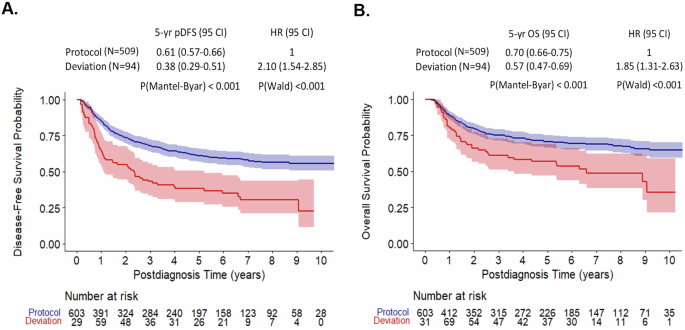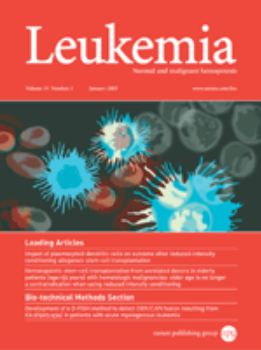Prognostic relevance of treatment deviations in children with relapsed acute lymphoblastic leukemia who were treated in the ALL-REZ BFM 2002 study
IF 12.8
1区 医学
Q1 HEMATOLOGY
引用次数: 0
Abstract
Relapsed Acute Lymphoblastic Leukemia (ALL) is among the most common causes of cancer-associated deaths in children. However, little is known about the implications of deviations from ALL treatment protocols on survival rates. The present study elucidates the various characteristics of treatment deviations in children with relapsed ALL included in the ALL-REZ BFM 2002 (i.e., Relapse Berlin-Frankfurt- Münster) trial and determines their prognostic relevance for relapse and death rates. Among 687 patients, 100 were identified with treatment deviations, further classified, and examined by occurrence time, cause and type. Protocol deviation was considered a time-dependent variable and its impact on Disease Free Survival (DFS) and Overall Survival (OS) was examined using the time-dependent model Mantel Byar. Five years after the relapse diagnosis, deviations were significantly related to both inferior DFS (38%) and OS (57%) rates compared to protocol conformed treatment (DFS = 61%; OS = 70%, P < 0.001). Based on multivariate analyses, protocol deviation proved to be an independent adverse prognostic factor of DFS. Moreover, deviations triggered by chemotherapy-induced toxicity were associated with a higher relapse rate compared to deviations due to insufficient response. Therefore, to avoid impairment of results by deviations, future clinical trials, and treatment strategies should focus on less toxic treatments and stricter protocol compliance.


在ALL-REZ BFM 2002研究中接受治疗的复发性急性淋巴细胞白血病儿童治疗偏差的预后相关性
复发性急性淋巴细胞白血病(ALL)是儿童癌症相关死亡的最常见原因之一。然而,人们对偏离ALL治疗方案对生存率的影响知之甚少。本研究阐明了ALL- rez BFM 2002(即复发柏林-法兰克福- nster)试验中复发性ALL儿童治疗偏差的各种特征,并确定了它们与复发和死亡率的预后相关性。687例患者中,有100例患者存在治疗偏差,进一步进行分类,根据发生时间、原因、类型进行检查。方案偏差被认为是一个时间相关变量,其对无病生存期(DFS)和总生存期(OS)的影响使用时间相关模型Mantel Byar进行检验。复发诊断5年后,与方案符合治疗(DFS = 61%;OS = 70%, P < 0.001)。基于多变量分析,方案偏差被证明是DFS的一个独立的不良预后因素。此外,与反应不足引起的偏差相比,化疗引起的毒性引起的偏差与更高的复发率相关。因此,为了避免偏差对结果的损害,未来的临床试验和治疗策略应侧重于毒性较小的治疗和更严格的方案依从性。
本文章由计算机程序翻译,如有差异,请以英文原文为准。
求助全文
约1分钟内获得全文
求助全文
来源期刊

Leukemia
医学-血液学
CiteScore
18.10
自引率
3.50%
发文量
270
审稿时长
3-6 weeks
期刊介绍:
Title: Leukemia
Journal Overview:
Publishes high-quality, peer-reviewed research
Covers all aspects of research and treatment of leukemia and allied diseases
Includes studies of normal hemopoiesis due to comparative relevance
Topics of Interest:
Oncogenes
Growth factors
Stem cells
Leukemia genomics
Cell cycle
Signal transduction
Molecular targets for therapy
And more
Content Types:
Original research articles
Reviews
Letters
Correspondence
Comments elaborating on significant advances and covering topical issues
 求助内容:
求助内容: 应助结果提醒方式:
应助结果提醒方式:


